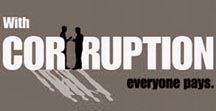Socio-psychological impact of bribery and corruption on young adults
by Indeewara Thilakarathne
A paper titled 'Social and social-Psychological impact of bribery and
corruption on Young Adults in Sri Lanka' was recently presented at the
Organization of Professionals Association (OPA). The presentation was
made by Professor S.T. Hettige of Colombo University.
 The research which was conducted using qualitative method of Focus
Group Discussion (FGD) among 308 youth representing a wider segment from
the middle and lower strata of society, was primarily aimed at creating
a qualitative data base in order to raise public awareness, initiate
action against corruption. The research which was conducted using qualitative method of Focus
Group Discussion (FGD) among 308 youth representing a wider segment from
the middle and lower strata of society, was primarily aimed at creating
a qualitative data base in order to raise public awareness, initiate
action against corruption.
The respondents drawn from diverse sectors including transport
workers, businessmen, A/L students, farmers, plantation workers,
pavement hawkers, the self employed, Tsunami affected communities,
University students, Migrant workers, overwhelmingly admitted that the
level of corruption in Sri Lanka is either 'high' or 'very high' and
identified the police as the most corrupted social institution.
The study stated that since the introduction of open market economy,
the transition from the non-competitive market to the highly competitive
market had brought about significant changes resulting in creating a
conducive socio-economic environment for bribery and corruption.
The primary changes have been identified as spread of consumerism and
new life styles, spread of private consumption at the expense of public
consumption, increased social inequality and competition for resources
and loosening up of the social class structure.
It further suggests that these changes had also led to specific
developments in the socio-economic spheres which indirectly induced
bribery and corruption.
 Accordingly, industrialization and economic development concentrating
in and around Colombo, Population pressure on urban resources, such as
land, housing, schools, water, transport, the widening gap between the
rich and the poor, expansion of private consumption, marginalization of
English education, increasing competition for education, increasing
demand for private health care as public health system fails, increasing
private vehicles and competition in transport system, consumerist
life-style and demand for decent housing schemes, explosion in consumer
aspirations and affluent life-styles among a small group of wealthy and
powerful families, (Hettige 2007, 3-9), have substantially increased the
susceptibility of public to bribery and corruption. Accordingly, industrialization and economic development concentrating
in and around Colombo, Population pressure on urban resources, such as
land, housing, schools, water, transport, the widening gap between the
rich and the poor, expansion of private consumption, marginalization of
English education, increasing competition for education, increasing
demand for private health care as public health system fails, increasing
private vehicles and competition in transport system, consumerist
life-style and demand for decent housing schemes, explosion in consumer
aspirations and affluent life-styles among a small group of wealthy and
powerful families, (Hettige 2007, 3-9), have substantially increased the
susceptibility of public to bribery and corruption.
Reviewing the widespread corruption in the society, particularly in
Electoral Process, Police and Judiciary which has contributed to the
formation of public perception on bribery and corruption, the study has
found out that among the respondents, the most vulnerable and exposed to
corruption were Tsunami victims who had to rely on officials to get
their claim applications certified compelling them to bribe corruptible
officials and inter-mediates.
Overwhelming majority identified police (48.7%) as highly corrupt.
The respondents also mentioned Municipal Councils/ Provincial Councils
(5.2%), Schools (4.9%), the transport sector (4.5%) followed by
hospitals and GN as corruption prevalence areas.
As the pressure exerted on the respondents to bribe, 33% of the
respondents admitted that they were pressurized to bribe the officials.
The proportion was higher among transport workers (58%), followed by
businessmen (48%) and pavement hawkers (47%).
It has been observed that the transaction is either initiated by the
bribe-giver or a third party, a broker.
Majority of the respondents (53%) were of the opinion that bribery
and corruption can be stamped out while some respondents (31%) stated
that it be reduced. Generally, it has been accepted that although
bribery and corruption can not be completely eliminated under the
present economic set-up, it can be controlled if punitive measures are
taken.
The respondents have identified Government (36%), genera public (12%)
, politicians (12.6%) and higher officials (10.9%) as persons and
institutions responsible for preventing bribery and corruption.
The principle items involved in bribery have been identified as
Arrack, money, santhosam (money given as gratification), parties, food
and drinks, sexual favours from women. Corruption is wide spread in
public sector compared to private sector.
However, some respondents admitted corruption is a common phenomenon
present in both public and private sectors.
University students pointed out that some lecturers demand sexual
favours promising them higher marks at the examinations and is amounted
to bribery and corruption.
It has been identified the objectives of the bribe-givers range from
obtaining undue favours, expedite work and to do a task conveniently and
the bribe-takers create an atmosphere in relevant public institution
conducive to bribery and corruption.
It has been pointed at the presentation that the scope of the study
could have been widen to represent the entire spectrum.
However, this has not been facilitated given the constraints in
finance and in other resources. Some of the panellist were of the
opinion that the study established the feared scenario of
institutionalized corruption though public firmly believe that it can be
stamped out.
[email protected]
***
Suggestions
Overwhelming majority suggested:
A. Setting up of an independent body to deal with bribery and
corruption or empower commission on Bribery and Corruption without
political influence.
B. Recently, a Parliamentary committee (COPE) disclosed 25 public
institutions where massive corruption had occurred. No action has yet
been taken. This type of lethargic government attitude can lead to
serious consequences.
Respondents were asked to give suggestions to control or eliminate
bribery and corruption from Sri Lanka. Some respondents were pessimistic
and expressed the view that there is nothing that can be done to arrest
the trend as 'the whole country is submerged in bribery and corruption'.
They said that any action to control or eliminate bribery and
corruption in this society is like swimming up stream.
Some, especially the transport workers, held the opinion that any
increase in the penalty/fines for traffic offences would no doubt
increase the opportunities for bribery and corruption on the part of law
enforcement officers. They felt that when the penalties are reasonable
and affordable, offenders tend to pay the relevant fines to the
authorities.
Others were optimistic and said that if proper remedial actions are
implemented without partiality, bribery and corruption could be
controlled. Most of the respondents wanted an independent body to be set
up to deal with complaints of bribery and corruption, or else they
wanted to make the existing Bribery Commission more effective.
They also want these institutions to be independent, impartial and
non-politicized. Others suggested that anti bribery and corruption
messages should be included in school curriculum. They also suggested
that people must be motivated to be more religious minded and, or at
least to be concerned about their self-respect.
Respondents also wanted to maintain law and order impartially and
strictly. New laws may be introduced. There must be collective action
and must create public awareness. In this process the mass media have a
greater role to play, according to some respondents. Role of the mass
media in this regard is insignificant today. |
